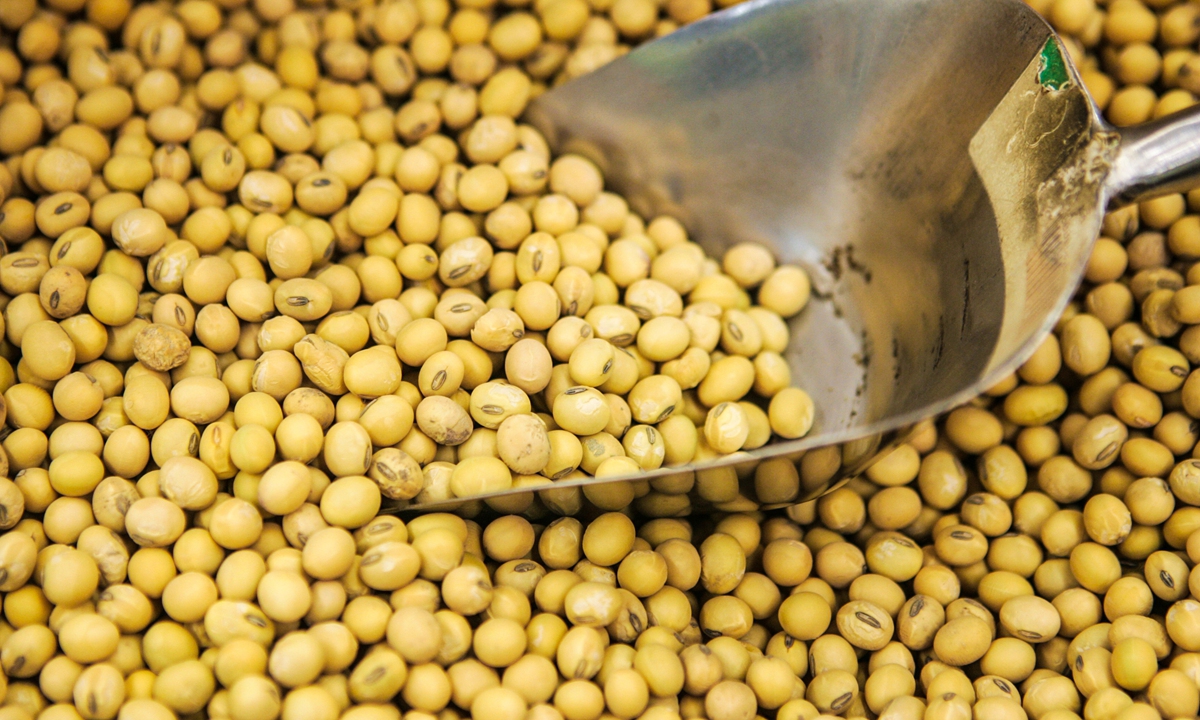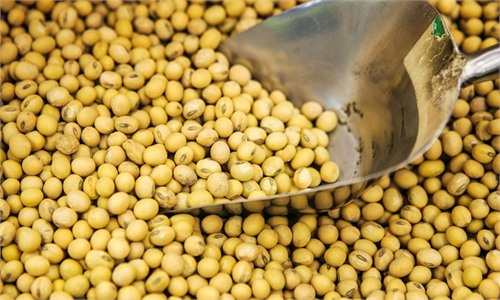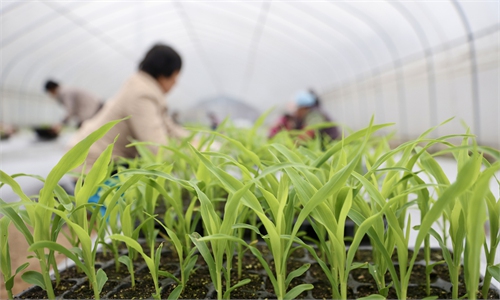Exclusive: US soybean industry pleased with phase 1 trade deal fulfillment, hopes trade continue to offer win-win results
American soybean exports reach new high amid win-win cooperation

Soybean Photo: VCG
China-US trade in farm goods, with soybeans as a pillar, set records last year with US exports of $36.4 billion to China, growing year-on-year for a second year, US government data showed.
The figures show the significance of China's huge market and resilient demand and the commitment to the bilateral phase one trade deal in driving up trade flows.
The trade activities reflect how the joint efforts of both sides in implementing the trade deal achieved win-win outcomes, said experts, urging the Biden administration to abandon its zero-sum game and decoupling policy against China, and put more positive momentum into the sustainable and healthy development of bilateral economic and trade ties.
"Demand has been good this marketing year to date and is now at the second-highest level in the past five years at this point in the market year, despite external market conditions," Jim Sutter, CEO of the US Soybean Export Council and chairman of the US Agricultural Export Development Council, told the Global Times on Thursday in a written interview.
"The growth drivers of China-US food and agricultural trade reaching record levels were China's animal protein industry recovery post-African Swine Fever, continuing rising demand for nutritious protein in China, and the reliability of US suppliers amid a challenging global operating environment," Sutter said.
China is the world's largest soybean importer, accounting for nearly 60 percent of global soybean trade and half of the total value of US soybean exports. Speaking about whether this ratio will increase this year, Sutter said that "we believe that China will continue to collaborate to source US soy and soybeans of other origins to meet its needs."
After the two countries reached a phase one trade agreement in 2020, US exports to China strongly rebounded and returned to the growth trend seen since China's accession to the WTO. In the past two years, the value of US exports of soybeans, corn and other agricultural products to China hit new highs, US government data showed.
During the past three years, US exports to China nearly tripled, and China once again became the largest market for US agricultural products.
Sutter gave a lot of credit to the phase one deal, which he said was an important step to get wheels turning again in China-US agriculture and other trade relations, and it has been great and served both countries well in this regard.
In evaluating China's commitment to actively implementing the phase one deal on agricultural products, particularly soybeans, the US Soybean Export Council has been pleased with the level of purchases of US soy made under the agreement "although we would always like to be supplying more of sustainable US soy to meet China's needs," Sutter said.
"There are still some details in the phase one agreement that are yet to be finalized and we hope that ongoing discussions are taking place to get mutually beneficial agreement finalized," he added.
Despite this resilient trade, bilateral relations are overshadowed by uncertainties due to increasing US sanctions on Chinese companies in relentless efforts to intensify supply chain decoupling and technology export restrictions on China, its major trading partner, experts said. The recent balloon incident has made matters worse.
US curbs on chip equipment exports to China worsened the bilateral relationship and damaged normal trade and investment for companies on both sides, including some leading US semiconductor companies.
The Biden administration should understand that it is always important for the two major economic powers to strengthen bilateral economic and trade ties rather than pursue decoupling, especially in the face of a global economic downturn amid high inflation and geopolitical conflicts, Gao Lingyun, an expert at the Chinese Academy of Social Sciences, told the Global Times on Thursday.
In a recent video address to a conference themed Forecast 2023 organized by the US-China Business Council (USCBC), Charge d'Affaires of the Chinese Embassy in the US Xu Xueyuan also highlighted the role of "a stabilizer" that China-US economic cooperation plays in bilateral relations.
"We hope that the US business community will curb the negative factors that undermine cooperation and work together to bring China-US relations back to the right track, injecting more stability and certainty into bilateral economic relations," Xu said.
Such voices for cooperation were also echoed by US industry representatives. In an interview with the Xinhua News Agency, USCBC President Craig Allen said that US companies are "keen" to continue exploring Chinese markets. He stressed that the economies of the two countries should not decouple, while strengthening cooperation is beneficial for both sides.
Reviewing the achievements of US agricultural exports to China, Sutter told the Global Times that they are still celebrating the 40th anniversary of China-US Soy collaboration and US Soy having a presence in China.
"China-US food and agriculture trade is often referred to as the ballast in the China-US relationship. I'm optimistic that agricultural trade and soy trade will continue to provide this win-win situation for China and the US," Sutter said.
Sutter and his colleagues are looking forward to the upcoming China-US Heartland Event, where they will once again have discussions between Chinese and US officials and industry "to highlight the unique importance and strength of the China-US agricultural trade relationship."
There are many deep relationships and strong connections in both countries when it comes to animal nutrition, aquaculture, oil and soy products, according to Sutter.
Experts said there is a considerable amount of potential for China and the US to further tap into in multiple sectors, including trade, energy, and technology, especially given the expected consumption rebound of the Chinese market after the nation optimized epidemic response.
But all these can only be achieved with mutual respect and win-win relations, Gao said, noting that the world needs cooperation instead of competition more than ever.


